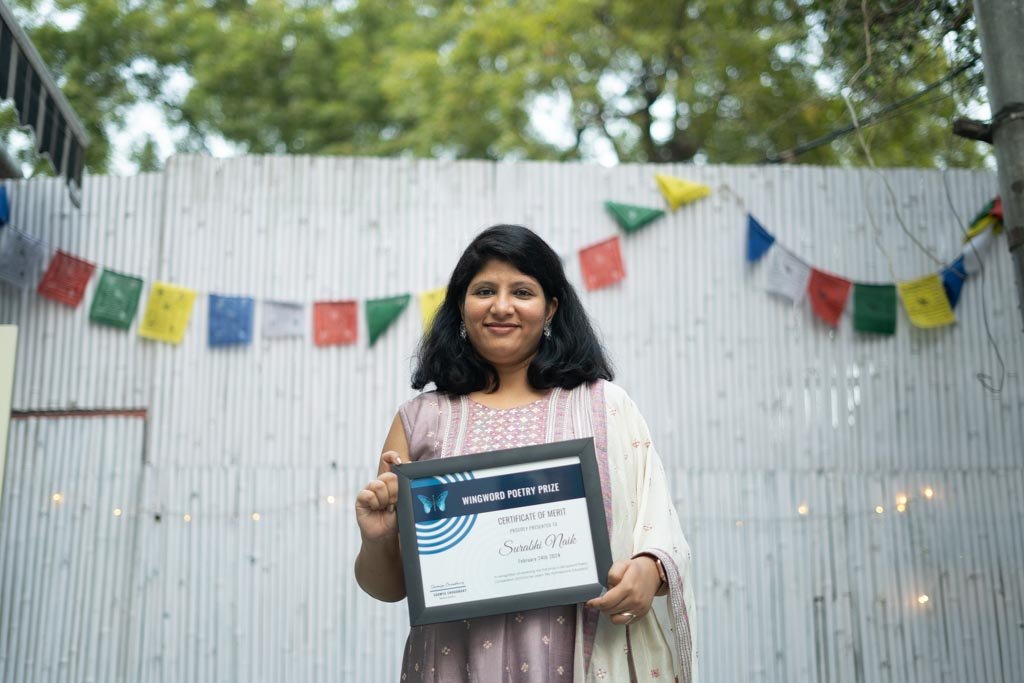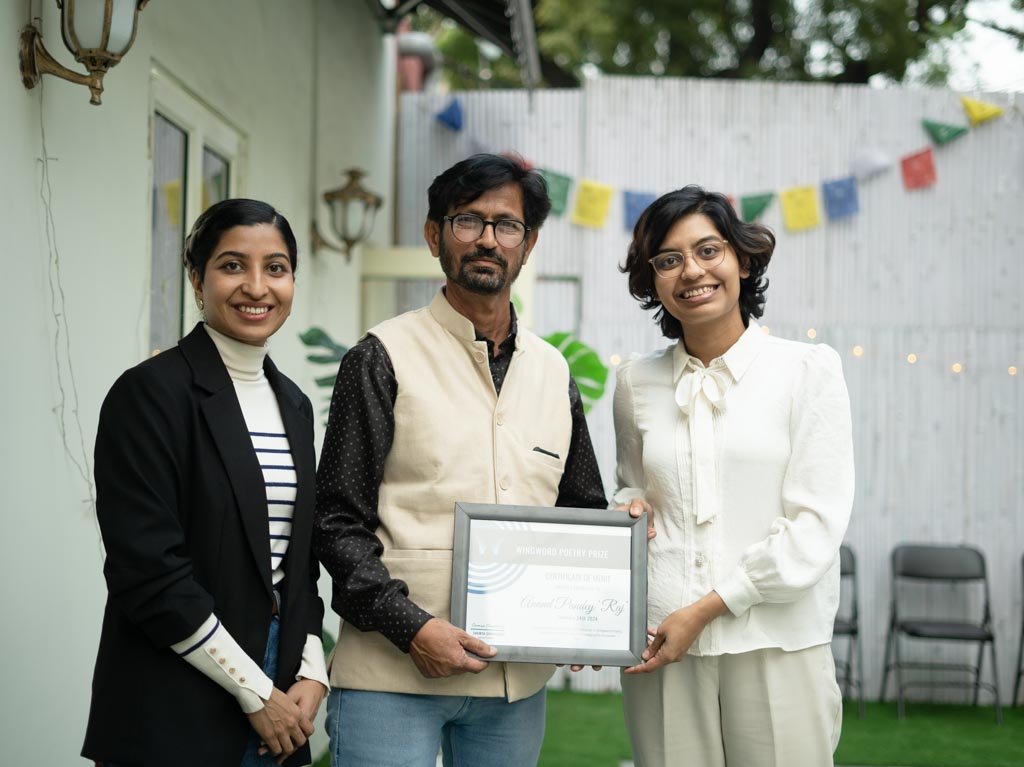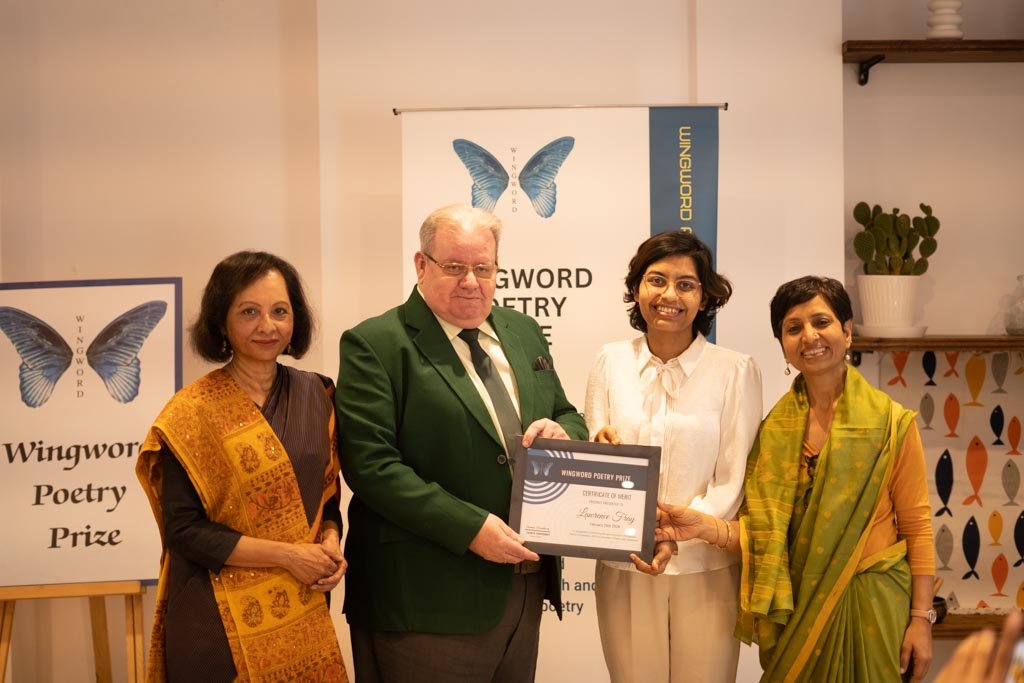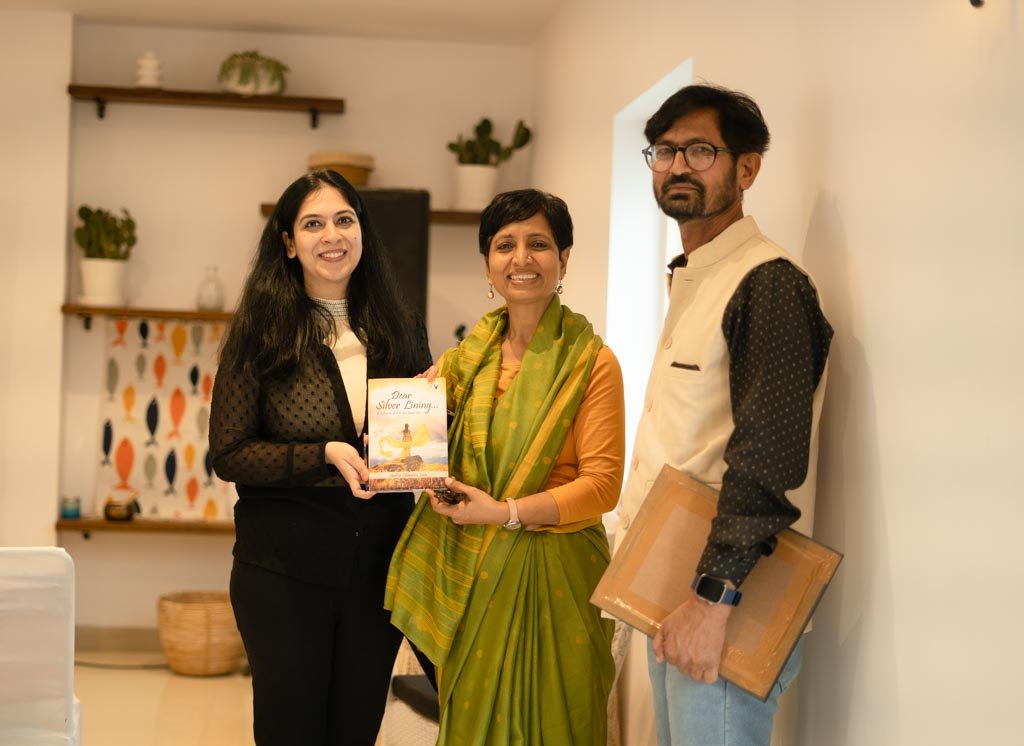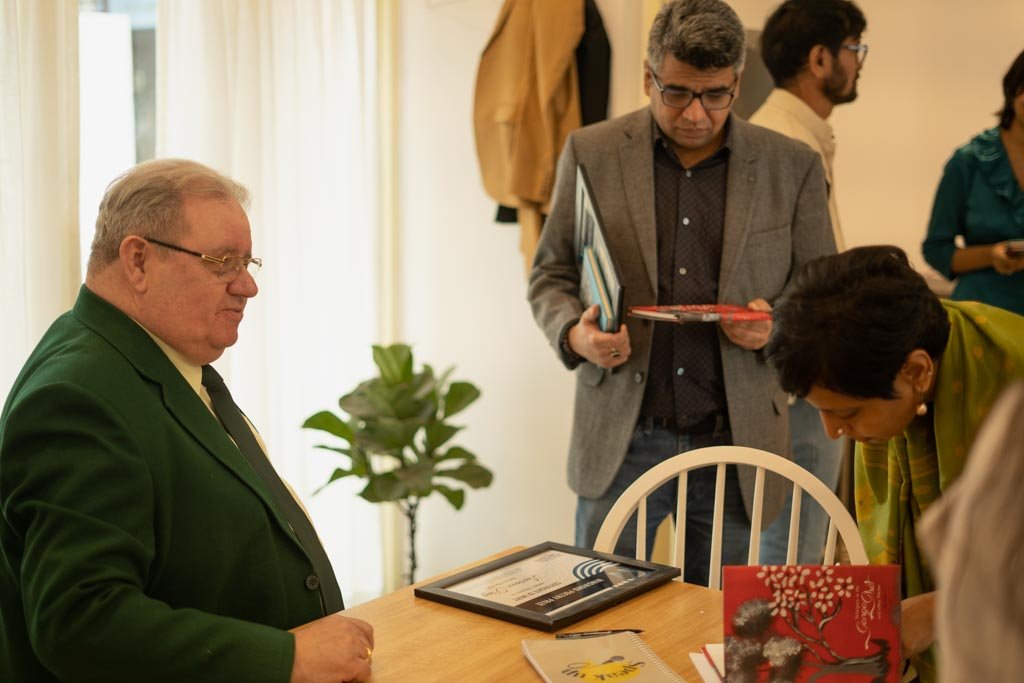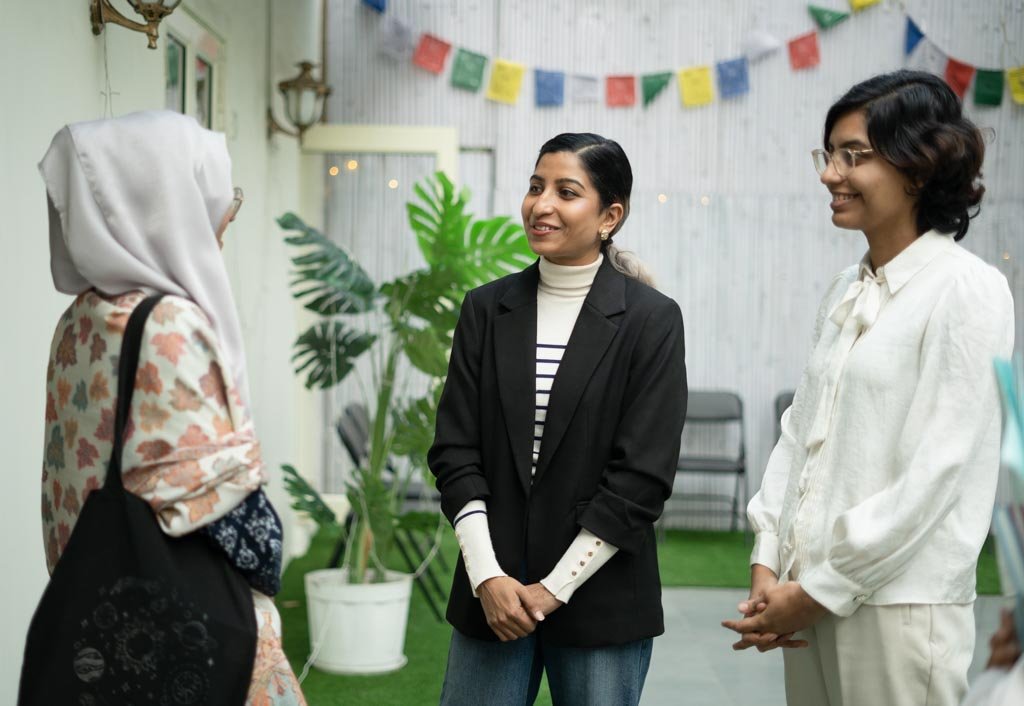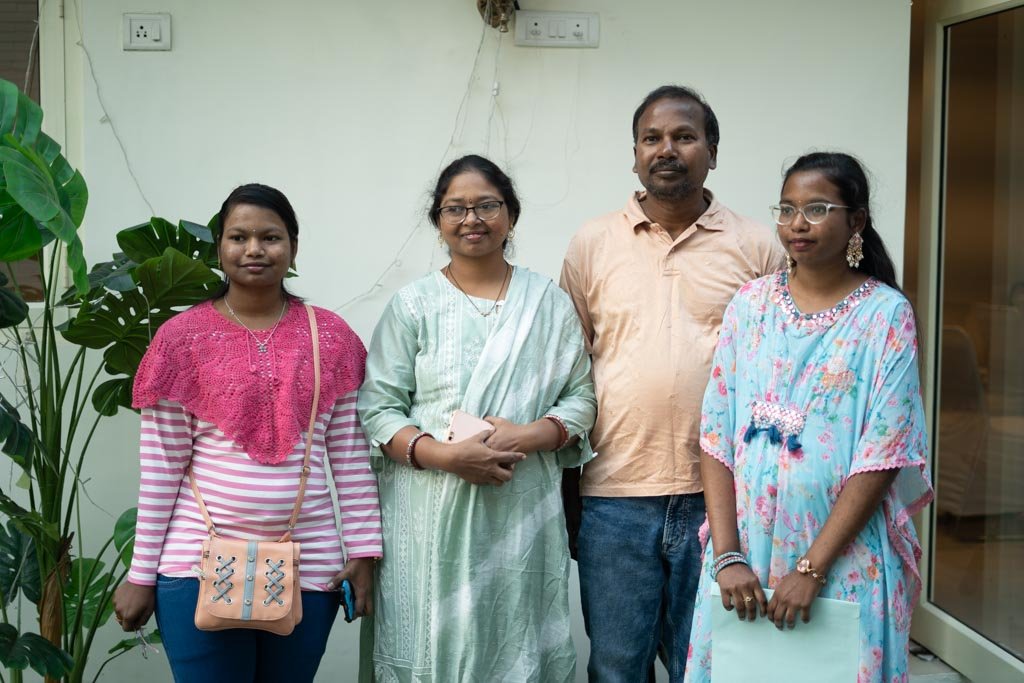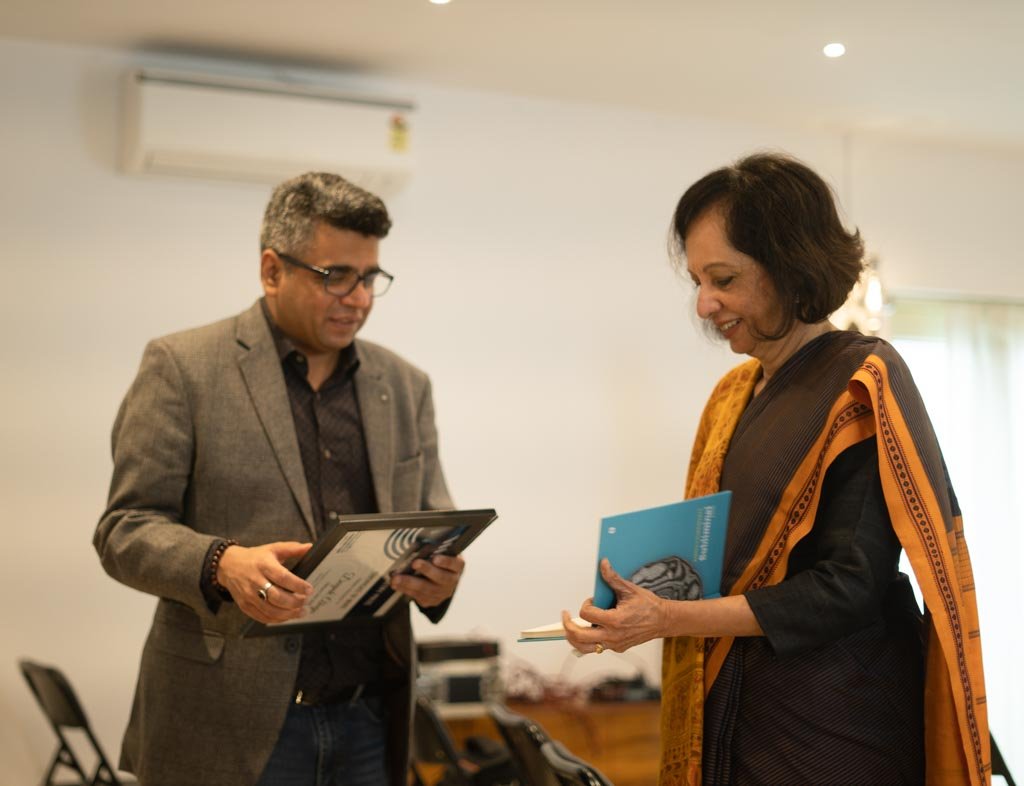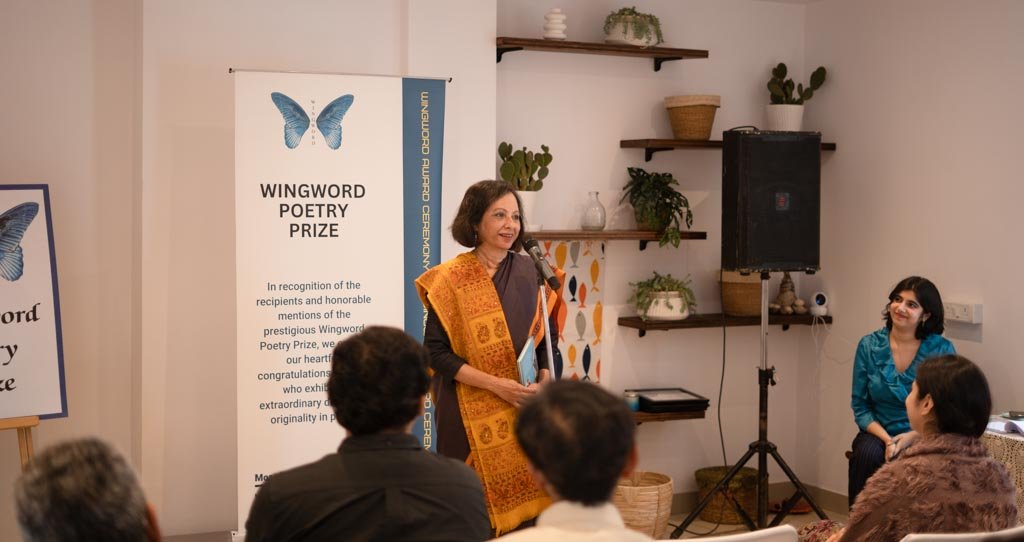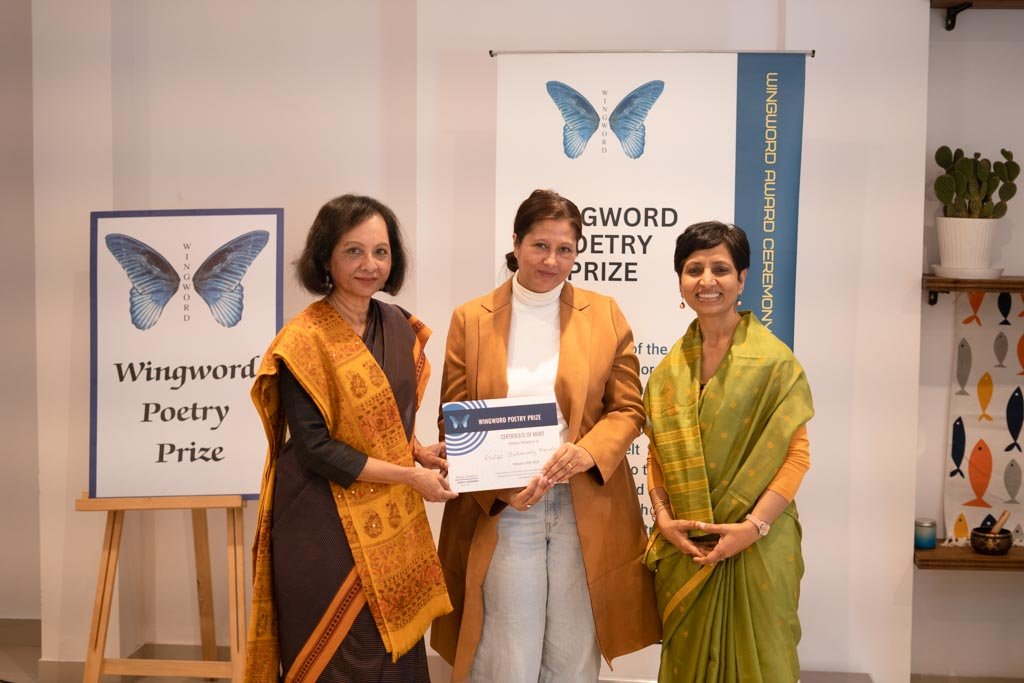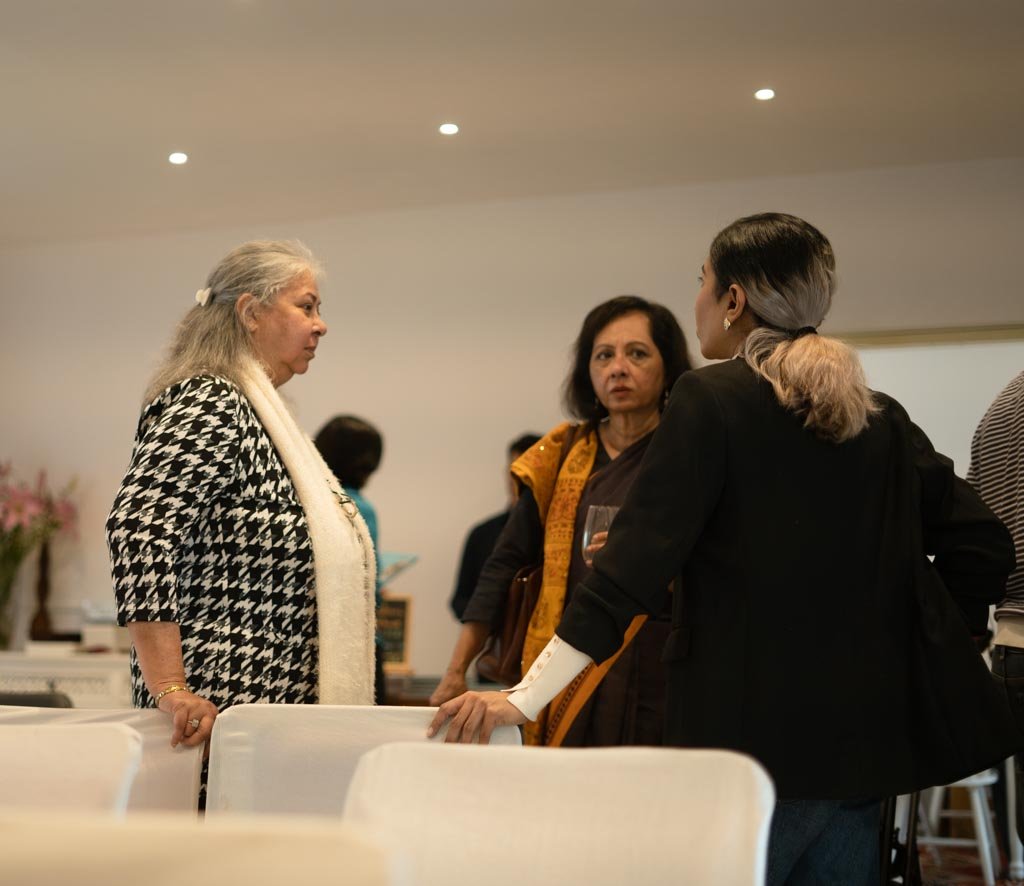The Wingword Anthology for the Summer Cycle is ready and being shipped out!
500 poets who were selected in the longlist of Wingword Poetry Prize 2024 Summer Cycle have been published in the anthology. The books are currently being shipped out.
As there are many books to be sent out, we are only able to ship them out in small batches due to the Post-Office limit on the number of shipments we can send in one day. Kindly be patient with us, our team is small but extremely hardworking, we assure you that we are doing everything to create the best experiences for our winners.
On the day your book is shipped out, you will receive a message on your WhatsApp number with the tracking info. If you live abroad, you will have to bear the extra shipping charges for us to send the book to your international address. We will message you regarding the same. All books will be shipped out by November 30th 2024.
When you receive your book, you can share a reel reading your poem from the book and tag us on Instagram @delhipoetryslam. We will love to share your video with our followers.
Please note: If you have any questions, you can send us an email on info@wingword.in. Do not DM your questions on Instagram. We are unable to respond to queries there.
Upcoming Award Ceremony: 15th December 2024
The Award Ceremony function of Wingword Poetry Prize Summer Cycle will be held at Two Roads Studio on 15th December 2024 in New Delhi. The prizewinners, commendable mentions and other participants are warmly invited to attend the ceremony.
The event will also be attended by prestigious writers, editors, professors and journalists. Some of the prize-winners and commendable mentions will be given the opportunity to read out their poems in front of the other attendees.
Timing: 2 PM to 5 PM
Address: Two Roads Studio, 10 Sansad Marg, New Delhi- 110001
2023 Award Ceremony was held in New Delhi
The 2023 Wingword Award Ceremony to be held on 24/2/2024 in New Delhi
The Wingword prize ceremony, recognizing the victors of the 2023 competition, is set to take place on February 24th, 2024, in New Delhi. All participants, winners, and those receiving commendable mentions are warmly invited to attend the ceremony. Trophies and certificates will be conferred during the event. The program will include the top winners reading their poems, and press representatives will be conducting interviews. It is anticipated to be a splendid celebration of poetry and the fundamental reasons behind our engagement in poetic expression. To confirm your attendance at the award ceremony, please reach out to the organizer via WhatsApp at +918431701103.
An Evening to Remember: The 2022 Wingword Poetry Prize Award Ceremony
by Sameeha Sood
Picture this- deceivingly warm rays of sun permeate through the floor-to-ceiling windows of The Stainless Gallery, New Delhi, on a midwinter afternoon, the 18th of December, 2022. The wood-finished floors gleaming, freshly polished; rows upon rows of draped chairs. In a few short moments, the first of the audience members for the Wingword Poetry Prize Award Ceremony 2022 will begin to filter in.






As the guests settled in, the host and programme director for the Wingword Poetry Prize, Saumya Choudhury, gracefully stepped onto the stage and offered a welcome note, thanking the poets for their submissions and sincerely congratulating the winners of the prestigious competition. The competition in question is an international event held annually, wherein aspiring poets and writers come forth to showcase their talent and passion for the art. The Wingword Poetry Prize aims to encourage and amplify emerging voices from diverse backgrounds through the art of poetry, and is sponsored by Delhi Poetry Slam, a leading literary organization in India. As the day progresses, the ceremony will also feature several performers, previous awardees and current winners alike, each performing a uniquely stimulating and emotional piece and displaying the effort and creativity that went into their well-deserved accomplishment.
Following the host’s warm welcome, guest of honor Tansy Troy graciously stepped forth to congratulate the winners and offer some insight on the world of poetry. An avid writer, Troy has been telling stories and writing poems for as long as she can remember. Having graduated with a Masters in English Literature from King’s College Cambridge, she soon traveled across the globe, spreading the joy of literature and theater in schools in the UK, Palestine, Madagascar and India, especially in Zanskar and Ladakh. The esteemed guest’s varied career included a stint teaching Art at the Tibetan Children’s Village, Dharamsala, as well. In the recent past, Troy has published the Apple Press, a young people’s journal for children whom the world has passed by. The journal, first launched in October 2021, features colorful illustrations, vivid stories, and immersive poetry, and for each copy sold, one is gifted to a young person with limited access to technology and education. The guest of honor has a passion for writing and literature, and aims to increase access to the same for children across the globe. It was truly inspiring to witness her speak so deliberately about her motivation and her work. She cordially bestowed the certificates and prizes upon the winners of the 2022 edition of the Wingword Poetry Prize.
The first prize winner for the main category of the award, Nandana Dev Sen, stepped onto the stage to collect her award, posing for a photograph with the guest of honor while facing an enamored audience. The Indian-American writer, actor, screenwriter and activist currently resides in New York, and specially flew in for the Wingword Poetry Prize award ceremony. She performed her award-winning poem ‘Daybreak’, dedicated to her grandmother Radharani Deb. The nostalgic piece of art reminisces about the poet’s cherished childhood moments spent with her beloved grandmother, and the tremendously personal ode moved many an audience member. Sen’s experiences as portrayed through her poem are simultaneously unique to her and universally understood, and the audience was deeply touched by Sen’s sentimental rendition.
“how you walked into my room
with unsteady steps
on the winter nights of my finals
“To bed!” you scolded, even as
I muttered formulas I’d never follow
and dozed over tea-stained history
you denounced all-nighters
but you stayed up with me
every night”
(Daybreak by Nandana Dev Sen)
The first prize-winner also read out a number of poems from the novel ‘Acrobat’, a collection of poetry by Nandana’s mother Nabaneeta Dev Sen, originally written in Bengali and translated by the Wingword Poetry Prize-winner to English. The collection rhythmically explores the ups and downs of ordinary life, delving into themes of womanhood, intimacy, and body politics. Compassionate yet conversational, the collection is truly a wonder, and Nandana Dev Sen’s masterful translation retains the musicality and rhythm of the original Bengali. Witnessing the poet’s voice overlap that of her mother’s as she read a few pieces from ‘Acrobat’ was an intimate, irreplaceable experience for everyone present at the award ceremony.
I am a village girl,
who grew up away
from the chiya kamaans.
I belong here,
where the famously marketed
darjeeling tea
is picked by my people.
Generations
born and dead within
tea plantations.
(darjeeling tea by bibhusha rai)
The second prize winner of the main category, Bibhusha Rai, hails from Darjeeling and holds a Master’s and Bachelor’s in English Literature from Delhi University. An ardent reader and writer, Rai holds the words of Austrian poet Rainer Maria Rilke close to her heart, “What matters is to live everything. Live the questions for now.” The colorfully dressed poet stepped forth to receive her merited award, however it wasn’t just her bright pink sweater that drew the attention of the earnest audience. Her impactful performance of her poem ‘Darjeeling Tea’, a captivating piece about the exploitation of workers in tea plantations in the eastern town, turned heads across the room. Considering themes of food and identity, the poem speaks on the outrageous juxtaposition of the reverence of Darjeeling tea across the world and the negligence of the true lifestyles of those that labored long and hard to provide that tea. The poet powerfully reprimands the ignorance of the larger public when it comes to the treatment of the people of Darjeeling, and her performance was a striking sight to behold.
The Wingword Poetry Prize is an international event, and the competition is not limited to just one language. The award ceremony on the 18th of December saw winners of the regional category of the competition as well, with the first prize winner for the category being Suniti Kumar Maity for his poem ‘অভিসার’ (meaning ‘convergence’). Traveling from Kolkata to collect his award, Maity spoke of his inspiration to write, which comes from divinity. The second prize winner, Sibu Kumar Das, collected his award for his poem ‘Mahanadi’, which considers the uncontrollable nature of rivers, and of how they cannot be owned. Das traveled from Orissa for the ceremony, and offered insight on the issue of state quarrels over rivers. The third prize winner for the regional category was also present at the ceremony. Spondon Ganguli, also traveling from Kolkata, received his prize with his wife and daughter. He read out two of his poems, including the prize-winning piece ‘তুমি আমার প্রভু’, translating to ‘you are my lord’. All three poets are well-deserving of their admirable accomplishment, and their passion for the art of writing was visible as they offered a few words on their poetry.
A truly eventful afternoon, the 2022 Wingword Poetry Prize award ceremony also witnessed previous winners of the competition. A graduate from the University of Sheffield, author and educator Zarin Virji, the second place winner of the 2020 edition of the competition read her poem ‘The Killing Fields’, a provocative piece interlinking violence, caste hierarchy and the normalization of rape culture in our society. In a past interview with the Wingword Poetry Prize, Virji mentioned that she intended to capture the sensationalization and frustration, as well as the eventual disregard, that come with the unfortunately frequent cases of violence against women, in India and abroad. Current Ashoka University student Eshna Sharma was also one of the performers of the evening. First place prize-winner for the 2019 edition of the competition, Sharma performed her poem ‘Dinner Table Conversations’. The poet’s writing often traces her personal growth as she matures, and the poem in question is an immersive piece narrating a family dinner and hinting at the weight of everything the family leaves unsaid as they dine. Outlining themes of identity, alcoholism, and an impending divorce, as well as the harrowing reality of self-harm amongst teenagers, the poem is a heartrending work of art. Finally, the ceremony also featured Anurima Mukherjee, winner of the first prize of the Wingword Poetry Prize 2019’s junior category. Mukherjee’s poetry often features themes of nostalgia, existential crises, mental health, and current affairs. The aspiring poet performed her piece ‘Through Calcutta’s Streets’, reminiscing on the somewhat mundane yet beloved experience of walking through the streets of Calcutta growing up. What an inspiring evening the ceremony turned out to be, with past and present winners alike coming together and sharing their work and experiences through a common language — poetry.
The final event of the evening was a networking session, where poets could interact with one another and gain insight on each other’s process and inspiration. Members of the audience interacted with the recipients of the awards and commendable mentions and discussed the intricacies of writing and composition. Audience members and winners alike engaged in deep discussion on themes and philosophies represented through poetry, and the event provided aspiring poets the opportunity to network with individuals further along in their journey to being published writers and poets. It was a profoundly insightful ending to an evening entirely dedicated to celebrating creativity, inspiration, hard work, and most importantly, poetry.
Virtual Award Ceremony | 2019
by Ria Chakraborty
A virtual award ceremony was hosted for the winners and commendable mentions of Wingword Poetry Prize on 20th September 2019. Due to the pandemic, a physical award function could not take place this year, so Wingword Committee decided to honour the winners using today’s technology at hand.
Books Launched: Riding On The Summer Train (English poems) and Raag Palash (Hindi poems)
Chief Guests: Jamaal Jackson Rogers, Laurie Ann Guerrero and Vancouver Shullai
Performers: Eshna Sharma, Anurima Mukherjee, Cherime Winchi R .Sangma and Karmishtha Krishna
On an autumnal evening, 20th September, 2020, the award ceremony of Wingword Poetry Prize 2019 occurred in the virtual realm, embellished with poetic magnificence, the fervour of an enchanted audience, eloquent performers and prolific guests from all over the globe. The host of the event and the programme manager of Wingword Poetry Prize, Saumya Choudhury initiated the ceremony by warmly congratulating the winners and receivers of the commendable mentions in the poetry competition. Acknowledging with sheer elation that the writers’ poems have been published in two poetry anthologies titled, “Riding On The Summer Train” (English poems) and “Raag Palash” (Hindi poems), the host gleefully announced that the books would be available on Amazon. The phenomenon is symbolic of a dream transitioning into a palpable reality for the poets as sculpting their thoughts into a tangible work of literature is the cherished aspiration of countless writers. Saumya stated how the poets’ determination and creativity set a paradigm for all of us and further elaborated on their identities: the writers hailed from diverse regions of the country and encapsulated a broad range of ages. The strength that the voice of youth carries was also applauded.
The host conducted an interactive discussion by enquiring about the cities of residence of the viewers and received a kaleidoscopic response: the audience, of over a hundred people, belonged not only to the diverse crevices of India, viewers from the United States of America, Canada and Germany had also joined in. This occurrence is a testament to the prismatic glory of poetry, written and adored by readers worldwide and the universality of the spellbinding power of words. Upon being asked about their motivation to indulge in writing, the audience responded with a myriad answers, such as the pristine form of nature, everyday happenings, their family members, emotions, their cathartic urge to express and an array of social causes. The viewers also elaborated on their respective support systems: the people that assisted them in exploring their proclivity to write such as their families, friends, favourite authors or even colleagues. I was deeply touched by this exchange of ideas and feelings; I found it truly heartwarming and moreover, engaging with and delving into the minds of the writers was an enriching experience for me. The interactive session enabled the audience to go beyond the verses of the writers’ poetry; it gave them an opportunity to discern the poet from the poems and a glimpse into their ardent personalities.
The host joyfully showcased the glossy-covered anthologies of English and Hindi poems: “Riding On The Summer Train” and “Raag Palash”, respectively, evoking a sensation of cheerfulness amongst the published poets. The compilations of poetry consist of a countrywide mélange of poetic and erudite splendour, lush with the writing prowess of the poets. It was also heartening to observe that a book consisting of Hindi poems has been published; this initiative would inspire the regional writers to articulate themselves in their mother-tongues and would provide an impetus for the miscellany of languages in India to flourish.
Photo credits: MASC
The host then graciously welcomed one of the chief guests of the evening, Ottawa’s English Poet Laureate, Jamaal Jackson Rogers. Rogers, whose stage name is Just Jamaal the Poet, has had an illustrious career as a writer; he is an award winning poet, social engagement officer, arts educator, creative entrepreneur, and spoken word artist. He was chosen as Ottawa’s first English Poet Laureate and he has also been honoured with the Ontario Arts Educator Award in 2016. He is the Artist-in-Residence for the Winter Term, 2020 at the Faculty of Arts and Social Sciences in the University of Carleton. The themes of his poetry include an assortment of subjects ranging from spirituality, contemporary social issues, emotional upheavals, filial love to the wryness of human condition and he experiments with free-verse, visual elements and rap. His work has been featured in festivals, documentaries and educational institutions worldwide. He utilises The Origin Arts & Community Centre to indulge in pedagogy and advocacy in the arena of arts. Rogers has enlivened his creative process by establishing a connection with his audience, both on a local and international level and forming a bond with them during his workshops and performances.
Jamaal addressed the praiseworthy feat of getting one’s poetry published and the colossal significance of the act as it facilitates the young writers with a platform. He ecstatically shared an adage, that had been conveyed to him by his guru, “keep writing, keep reciting”. The phrase possesses enormous powers in its simplicity; it strengthens the writers to scrawl their thoughts and empowers them to vibrantly breathe life into their work by adding theatrical elements. He emphasised the captivating contours of storytelling that can be highlighted through spoken word performances.
Jamaal quoted one of his favourite poets, Rumi’s lines, “Raise your words/not your voice/it is the rain that grows flowers/not thunder”. He reminisced about the impact that the verse had left on him and initiated a discourse about how the writer’s words are the catalysts for development and how electrifyingly mighty they are. The poets’ creations are capable of bringing about a transformation in the society and, hence, Jamaal, indelibly influenced by Rumi, spoke about the wellspring of strength that resides amongst all the writers. I found Jamaal’s presence invigorating; there is a pure delight that stems from witnessing someone fervidly talking about their passion. Jamaal has pursued poetry professionally and is a literary inspiration to all the blossoming writers who get to experience his radiant personality and read his gorgeously articulated poems. He is well-aware of his responsibility as an artist and vehemently ensured that the young writers watching him get acquainted with the sacredness of the creative process.
I felt utterly enlightened when Jamaal mentioned the pious ritual that the artistic practices entail and the intricacy that is involved in weaving verses brimming with profound metaphors, symbolism, foreshadowing, lively imagery and well-crafted entendres. His speech helped me address the privilege that my flair for writing bestows upon me and the need to honour its sacredness. Jamaal talked about poetry is more than just an exchange of language or a medium of communication; it was a catalyst for healing and it deeply resonated with me. I found the analogies that Jamaal drew especially empowering; by comparing the poets to engineers, masons, doctors, magicians and even alchemists, he established that all these people have a proclivity for exploring a certain field, procuring knowledge and disseminating their art and services. The element that all these professions have in common is the artists’ expertise in the sphere of manipulating the environment in order to birth a novel creation. This logic depicts how discernibly important the poets’ roles are in the society and in order to shed light upon the subject, the award-winning poet alluded to the mediaeval eons wherein the royalty patronised poets and artists as they moulded the society’s perceptions about their emperors.
Watching him speak moved me emotionally; it made me realise how speaking your truth to power is imperative. It taught me that writers must let authentic poetry gush out with all is raw vulnerability and urgency in order to capture poignant moments and also, by paying conscious attention to your creative process, you can manifest a change in your circumstances. As someone who reveres Langston Hughes, it was a beautiful experience to hear how Jamaal was able to appreciate Hughes’ poem “Harlem”. The Canadian poet, who moved to the nation in his childhood, could relate to the poem as a young South American migrant with a strong Caribbean patois while he was acquainting himself with an unfamiliar culture and country. His admiration for the poem encouraged him to write and when the Poet Laureate position in Ottawa was revived after 27 years, albeit he was skeptical at first, he participated and was subsequently honoured with the title. The aspect that enamoured me the most about Jamaal’s speech was how equipped he was with felicitous references; he discussed how as a poet, the law of quantum physics is applicable to the art of poetic brilliance: if the writers dedicate themselves to burnishing their craft at the molecular level, they can churn out incredible creations. I was overwhelmingly influenced by the words that Jamaal concluded his speech with: he galvanised the viewers with a newfound energy luminescent with poetic license, agency and independent potential and the wisdom of being kind to one’s writing process and spiritedly persuaded us to tap into it by never giving up on the art.
Photo credit: Matthew Mahon
Laurie Ann Guerrero, the Poet Laureate of State of Texas in 2016, and the Writer-in-Residence at Texas A&M University-San Antonio, was greeted merrily by the audience. She has authored two compilations of poetry which consist a chapbook of poetry, Babies Under the Skin and Tongue in the Mouth of the Dying. She is the recipient of the Panhandler Publishing Award and the Letras Latinas Andrés Montoya Poetry Prize. Guerrero is also working on an upcoming poetry anthology titled “New & Selected: I Have Eaten the Rattlesnake”. Her writing has been featured in Texas Monthly, Acentos Review, and Women's Studies Quarterly. Her message of encouragement to the writers saluted the valour of the poets who are able to unveil themselves on paper with honesty and praised the softness in the willingness to be vulnerable and how it wields power and empathy. Listening to an accomplished, professional poet elicited a surge of inspiration within me.
The viewers were thrilled to see the next Chief Guest: the charismatic and quick-witted Vancouver Shullai, who was also the recipient of the Wingword Poetry Prize in 2017. A fervent artist from Shillong with a master’s degree in English with Communication Studies from Christ University, Bangalore: Vancouver was also a musical prodigy as he received the National Child Award for Singing in 2010. The young writer’s scintillating prowess is showcased exquisitely in his critically acclaimed collection of poems titled, “How to Love a Broken Man”. Shullai offered a few writing tips: aspects that he likes to keep in mind while working on his poems. Whilst proceeding with his speech, he emphasised the fact that every writer’s creative process is distinctive as it accommodates each individual’s requirements and desires.
The first attribute of poetry that Shullai stressed upon was the need to remain honest and sincere with one’s work and how poems must unspool with the feelings that overwhelm us. He examined the young and emerging poets’ exasperating need to seek validation from renowned writers or critics in order to be perceived as eloquent and legitimate poets that cajoles them into writing with a hint of pretentiousness. While Shullai conceded that he had been in the same place at a point in his artistic voyage, he asked writers to be mindful of letting people’s opinions seize their writing processes. He encouraged the writers to abandon their urge to sound clever by verbosely using big words and instead, be utterly raw on paper. Aureate poetic grandeur can be seamlessly woven from everyday occurrences. “It’s all about making the familiar unfamiliar. Simplicity is the trademark of genius,” Shullai said, beaming.
Shullai also analysed the apparent outpouring of poetry on social media sites and, also went on to mention that many poets in the nascent stage of their careers had reached out to him on the platforms. The poet evidently has strong opinions about the dissemination and reception of poetry in the digital epoch. He pointed out how writers were coercing themselves into creating poetry about themes that their audience would appreciate instead of working on the subjects that they wished to write about. Vancouver had observed a pattern amongst young poets that suggested that their poetic brilliance was forsaken in order to induce gratification amongst their readers. “Double-tap on own your hearts, dear poets,” Shullai said; this quote is something that I would always carry with me on my journey as a writer.
Lastly, Shullai, who belongs to the majestic Khasi community of Meghalaya, advocated for embracing the privilege of being associated with a culture and learning one’s mother-tongue as it is a fulfilling experience and would render the poet capable of expressing himself by concocting beautiful potpourris of literature in multiple languages. What confounded me the most about Vancouver was how impeccably mature he was as a young poet. His well-informed outlook that assisted him in formulating these writing tips would certainly shape the budding writers’ creative trajectories.
The final segment of the ceremony was a poetry reading of the selected winning works of Wingword Poetry Prize 2019. Eshna Sharma, an eighteen-year-old writer from Lucknow who is pursuing an undergraduate degree at Ashoka University and, is the winner of the Wingword Poetry Prize 2019, jubilantly expressed surprise at her poetic achievement.
“Sharma Ji's daughter is getting married next week,
‘Should we look for a boy for you too?’
This time, I smile.
‘No ma, I've been in love with a girl since I was fourteen.’ ”
(Dinner Table Conversations by Eshna Sharma)
The ostensible simplicity of the poem and its ominous undertone manufactured a vivid juxtaposition within the verses. Her poem’s setup is meticulously adorned with details; the imagery of its verses stood out as it painted an immaculate scene of a dinner table laden with platefuls of sumptuous food. The narrative of the poem is sapid with anguish and the weight of everything that has been left unsaid as a family dines. The underlying themes also discuss identity, alcoholism, an impending divorce and heart-wrenching instances of self-harming. With an elegant arc, the poem takes the readers towards an ending that they wouldn’t foresee.
“I left this place, long back and as they say,
‘The past keeps haunting you’
The memory of Calcutta strengths my
broken soul –
I wish when I die, put shiuli flowers on
my grave.
So that, everytime I feel lonely, I will
dream of my childhood,
Through the streets of Calcutta. ”
(Through Calcutta’s Streets by Anurima Mukherjee)
Anurima Mukherjee, a student of 9th grade from West Bengal is the winner of the Wingword Poetry Competition 2019’s Junior Category. As Anurima read her bittersweet poem, ripe with nostalgia, a slew of chills descended downwards my spine. Skimming through the poem, I felt as if I were vicariously strolling through the lanes of Calcutta and witnessing its bustle, abuzz with yellow-tinted taxis as the fleeting traces of the night-flowering jasmine, shiuli’s fragrance lingered.
“My Mother’s magnificent memories of yonder years,
Builds bridges to a past, I’ll never see;
Songs of Simsang, of mermaids and matchadu”
(My Mother’s Memories by Cherime Winchi R. Sangma)
I was wonderstruck as Cherime Winchi R. Sangma, a research Scholar at NEHU, Tura Campus, from Meghalaya, performed her poem. The ambience of her verses was rich with references to her heritage and succulent with a marvellous portrayal. The poem begins with a gleaming lyrical verse and concludes with a sordid ending, evoking a sensation of melancholy. I found it profoundly touching.
“I'm sorry, I did not listen;
While your misty eyes gleamed
And your riveted lips spoke
Words out of sheer strength;
About how new homes were built
More emotionally, than physically
More mindsets, than bricks”
(Bridges of Separation by Karmishtha Krishna)
Karmishtha Krishna, a 19 year old product design student from Pune was the final performer of the evening. Her poem nearly left me on the verge of tears; reeking with gloom, her verses were overflowing with remorse as she apologised to her grandmother for her willful ignorance and blatant apathy towards the elderly woman’s past. The realistic details such as to the allusions to historical events that furnished the poem and the masterful symbolism within it made its verses all the more real, all the more hauntingly beautiful. Readers can seek comfort in the fact that the poem ends on an optimistic note with a ray of hope.
My evening rendezvous at the Wingword Poetry Prize 2019 Award Ceremony was delightful; from the edification of young writers to the appreciation of the subtle beauty of art, the event silkily cascaded with a poetic elegance that enraptured me.

